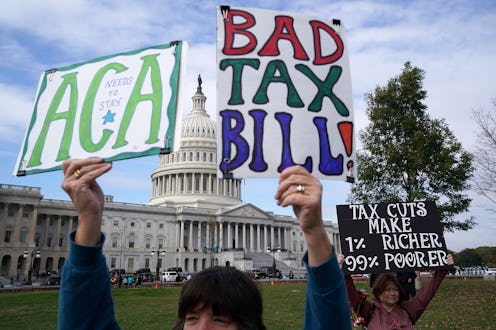
From April 14 to April 17, demonstrators plan to take to the streets to protest the massive GOP tax plan, which passed at the end of last year. The marches will mark the one-year anniversary of a similar protest, which demanded that President Donald Trump release his tax returns to the public. For those wondering how to find a 2018 Tax March near you, the organizers' website and social media posts are definitely the best bet.
While last year's tax march specifically demanded that Trump share his financial documents with the public, this year's protest has a different agenda. Specifically honing in on the omnibus tax legislation that was voted into law at the end of the last calendar year, organizers say that they are fed up with what they believe is an economic system that specifically benefits the wealthy. At the same time, they say, the middle and working class taxpayers are set to suffer.
The Tax March, the head organizing group behind the protests, is one of the best resources to turn to if you're looking to find a Tax March protest. The group's website has an events page that links to planned marches all around the country, and in many instances, includes any relevant Facebook pages made for individual demonstrations. It allows users to filter through events on a U.S. map. The website also allows users to RSVP so that organizers can estimate how many participants are likely to attend.
In the lead up to tax day — the deadline for filing individual federal tax returns — the group led a 100-day "Repeal The Trump Tax" tour to drum up support for their movement. Protests are largely planned to take place the weekend before the deadline, but many also take place on tax day itself, which is April 17 this year.
"In order to give tax breaks to millionaires, billionaires, and wealthy corporations, the TrumpTax raises taxes for 92 million middle-class families, rips health care away from 13 million people, and threatens life-saving programs millions of Americans rely on," Tax March organizers wrote on the group's website. Their central demand, they say, is that the "TrumpTax must go."
While the Tax March website provides the most comprehensive list of 2018 marches, the Facebook events search feature is another option, especially if you want to share that you plan to attend with people that you know.
The tax bill in question, known formally as the Tax Cuts and Jobs Act, was no minor piece of legislation. It provided massive tax cuts for some of America's highest earners, raised the thresholds that determine whether an individual or couple qualify as the highest earners, and slashed taxes for corporations.
Specifically, it cut the highest tax rate from 39.6 percent for married couples who earn at least $470,00 per year down to 37 percent. It also raised the qualifying income from $470,700 to $600,00 for married couples, and $500,000 for individuals, according to The Washington Post.
As for large corporations, their tax rate was 35 percent prior to the bill's passing. As of Jan. 1, 2018, they are only taxed 21 percent. The shift was billed as the largest corporate tax cut in American history.
Those two tax cuts only represent a fraction of the changes that the law represented. It also eradicated the individual mandate that required all people who can afford to do so to have health insurance or face a tax penalty, and raised the threshold for estate tax (taxes paid on inheritance) from $5.5 million to $11.2 million per individual. All of these changes combined result in a massive chunk of the country's highest earners paying significantly less into the U.S. tax pool, which is what is driving protestors into the streets in the days before taxes are officially due.
While participating in protests won't repeal the law directly, protesters are sending clear messages to elected officials that above all else, they're tasked with representing their constituents' interests. And protests and marches can be some of the most effective ways for voters to catch politicians' attention.